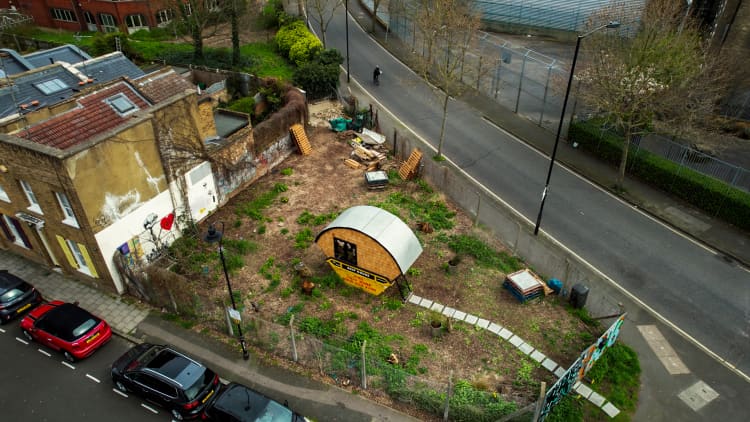[ad_1]
In 2016, Mark Lemoine came home from work and told his wife Karla Lemoine he wanted to quit his job and buy a campground.
There was a lot on the line: Mark made $200,000 per year working for the Michigan state government, and Karla was a stay-at-home mom. Two of their four children were in college. Both were lifelong campers, but they’d never owned a business.
Swayed by the promise of adventure, Karla agreed. Within six months, they found a franchised Kampgrounds of America site for sale in Benton Harbor, Michigan, a rural lake town nestled between Grand Rapids and Chicago.
The Lemoines put their house on the market, withdrew all their savings and “sold everything we owned to buy the campground” for $1.6 million, Mark says.
Mark and Karla Lemoine sold their house, car and more to buy a campground in Benton Harbor, Michigan.
Devin Lieberman
That wasn’t their only expense: Since buying the campground, they’ve spent another $1.5 million on renovations, and annual upkeep costs up to $700,000 a year, according to documents reviewed by CNBC Make It.
All those investments are paying off. The campground is now worth $6 million, a recent Kampgrounds of America valuation found. It brought in $1.2 million in revenue last year, enough for the Lemoines to pay themselves a combined $150,000 in salary.
They’re still $50,000 shy of their previous annual household income, but say they plan to keep running the campground for a simple reason: They’re happier.
“We saw the wear and tear of working for corporate America on Mark and on our family dynamics,” Karla says. “Now, owning our business, we’re the bosses. We create and manage stress. For us, it’s a healthier lifestyle.”
Here’s how they manage their finances now, and those of the campground.
Using all their resources
When Mark and Karla first decided to buy the campground — officially called the Coloma/St. Joseph KOA Holiday site — they were five years away from paying off their house in Rockford, Michigan. That meant they had to get creative to find their $1.6 million.
They sold their car, and made $1,500 selling their things in a garage sale. They took $20,000 out of their personal savings and Roth IRAs, and $200,000 from their 401(k)s. They sold their house for another $180,000, and covered the remainder with a bank loan, they say.
The Lemoines had to get creative to pay for their dream $1.6 million campground.
CNBC Make It
After selling their house, the Lemoines moved with two of their children into a four-bedroom apartment above one of the campground’s general store. It took time for their kids to adjust, Karla says, but the couple knew the decision would eventually lessen the strain on their family.
“People think a steady job, a steady paycheck and a good employer is security,” Karla says. “Mark had been through a couple of downsizings in his career, and I think we just realized you can’t always count on [those things]. We decided to take control of our own future, our own destiny.”
Adding non-traditional revenue streams
When the Lemoines bought the campground, it had been around for 48 years. It came equipped with cabins and designated zones for tents and RV parking, but nearly everything needed updating.
They immediately renovated the bathrooms and completely redid the general store. They built a “robust cafe,” Mark says, adding another revenue source that doubled as a place for campers to grab a snack or coffee.
The payoff wasn’t immediate. In their first camping season — April to October — the park brought in $390,000. They put almost every penny back into the campground.
The Lemoines added several upgrades to the campground, including glamping tents, to build revenue.
Devin Lieberman
The strategy worked: The campground’s annual revenue grew. So in 2021, they tried it again, taking out a $300,000 mortgage to add five deluxe cabins.
The renovations drove more business to the campground, along with a pandemic-era push to get people outside that summer, Mark says. The site brought in nearly $1 million in 2021 revenue, roughly $150,000 more than it did 2020.
Shifting how they think about money
In 2021, after all four Lemoine children officially moved out, Mark and Karla bought and moved into an 34-foot RV. They spend each offseason, from November to March, traveling the country.
The campground’s revenue hasn’t exactly made them rich. They consider the property their retirement fund, since they cashed out their 401(k)s to buy it in the first place. But one day, they plan to sell the site — and even at today’s valuation, $6 million would represent a significant return on their investment.
“It’s not like we just went out on a big vacation or bought a house that we can’t really afford,” Mark says. “We bought something that produces income, so that debt doesn’t scare us as much.”
For now, the Lemoines say they’ll keep operating and growing the campground, and traveling whenever they can. Even without factoring in a potential sale, the lifestyle shift has been worth every penny, they say.
“We describe it as a midlife reset where we just punch the button and did everything very different,” Mark says. “And when everything you own is literally underneath your feet, you got to figure out how to make it work.”
DON’T MISS: Want to be smarter and more successful with your money, work & life? Sign up for our new newsletter!
Get CNBC’s free Warren Buffett Guide to Investing, which distills the billionaire’s No. 1 best piece of advice for regular investors, do’s and don’ts, and three key investing principles into a clear and simple guidebook.

[ad_2]

